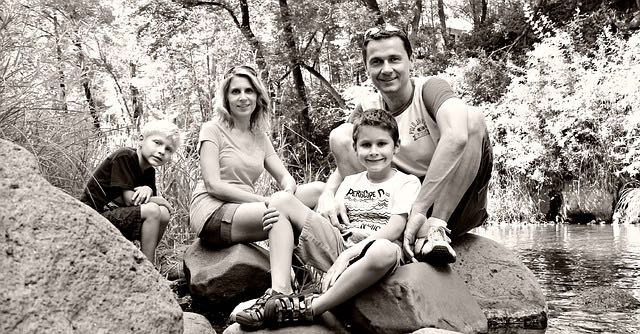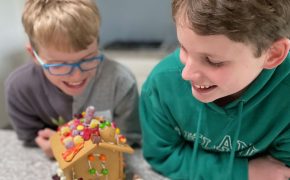Resilient Boys: How relationships, participation and belonging helps Boys stay mentally well
Raising children is challenging. They test us to our limits at time. Underneath any complaints about the gruelling nature of parenting, parents love their children and want them to live happy and long lives. Parents can offer much in the early parenting years to help promote good emotional wellbeing.
There are some factors that are core to promoting good emotional wellbeing and reducing the risk of mental illness. These protective factors are:
• Connectedness to individuals, family, community, and social institutions
• Problem-solving skills
• Contacts with caregivers
• Effective mental health care
(Suicide Prevention Resource Center, & Rodgers, 2011)
Below I look at how parents can contribute to the development of these protective factors in their boys.
Connectedness
A sense of belonging is important to human well-being. That’s why as parents we often work hard to ensure our child is happy at school and has friends. We fret when things aren’t going well or our child is feeling lonely and sad.
The first place of belonging is in the home. For many children this is a source of strength when things are tough for them in other social arenas. Having a good connection with your child throughout their growing years is vital. The relationship with parents is both a springboard in to the world and a safe place to fall when life inevitably presents difficulties.
Good relationships with children occur when consistent care and love is provided. It comes from providing for basic needs, from being attuned to your child’s emotions and being available to help soothe and protect them if needed. Create your own family rituals and spend time together having fun as a family to help make family seem worth belonging to.
Some children, as a virtue of their temperament or unique needs, are more challenging to parent than others. Try to see the positive qualities of your child even when you are struggling with them. If you are experiencing difficulties in your relationship with your child and it feels like more than just the day to day frustrations of parenting, for example you dislike spending time with your child or most of your interactions are negative, seek professional help via a community parenting group or private practice professional. It is easier to work on this before the teen years when peer interactions are a priority, so do it sooner rather than later.
If your child is having difficulty belonging at school, enrol them in other activities to give them an opportunity to belong elsewhere. Belonging to a team or group is beneficial and it helps when children are having difficulty at school with peers to have a positive connection with other children their age. Some children move school in response to social difficulties. Sometimes the same problem will follow to a new school due to a child’s personality factors so it is better to resolve it at the same school if at all possible. In extreme situations where a child is not being protected and is at real risk of harm, a change of school can help.
Problem-solving skills
Children who can problem solve tend to have better resilience. If you are reading this and panicking because your child struggles with problem solving, take a deep breath. Problem solving is a skill that takes time to build. Children’s ability to problem solve increases with age and continues to develop with improvements in logic and reasoning skills occurring until the age of 25.
Parents can influence the development of problem-solving by offering opportunities for children to problem solve situations. When children are angry, upset or despairing spend a little time settling emotions with understanding and care and then ask questions such as “what can we do to help? What might work?”. This is helpful to develop the idea that all problems have solutions if we look for them.
Reduce the amount of control you place on your child’s day to day life where possible and give them opportunities to make choices and decisions. Some parents try to control much of a child’s day to day world from what they wear, to what they eat and play with. This type of parenting doesn’t provide children with opportunities to make choices or identify what they need. This will not help your child develop problem solving skills and will also likely impact negatively on your relationship as they become a teen and dispute your control.
Ensure you model effective problem solving yourself. When I ask parents of anxious children who forecast the worst when things go wrong how they handle minor problems such as running late, the answer is often with great stress and the use of statements such as “ this is a disaster, my days off to a bad start”. Instead model calmness and try statements like “I wasn’t expecting this, oh well I will work it out” or “it’s just a hiccup, what can we do about it?” Be optimistic in your approach to solving problems.
Contacts with caregivers
This means that your caregivers are available when you contact them if something goes wrong or they are in distress. From a young age, make it clear to your child that you don’t just want the good news, you want to know when things aren’t ok. Nothing is so bad that we can’t talk about it, is a message from a protective behaviours program that fits well.
This means that when your children mess up or do the wrong thing and they come to you, you will need to be available and calm. As teens or adults they are more likely to do so if they know from past experience that you will hear them and help them problem solve rather than judge, shame or fall apart because you can’t handle your own feelings. Be your child’s rock, not the other way around.
Although I hope that my children will leave my home and become responsible adults, one message I impart is “if you need to, you can come home”. Communicate to your child that whilst you expect they will leave the nest, they will always belong to your family unit.
Effective mental health care
If your child or teen is showing signs of depression, prolonged sadness, fears that are restricting participation in daily life, being angry and upset often or seems disconnected from life, it is important to seek professional help. Your GP or school psychologist can be a good base to find an effective mental health provider who provides evidence-based treatment. If the first practitioner or agency you try is not a good fit for your child, do try other options.
And finally, keep in mind that parenting is a journey with daily opportunities to create connection and promote skill building. It can be frustrating when your child is struggling. Avoid excessive self-blame and instead remind yourself that consistent efforts over time do make a difference in a child’s life and that we all need a little help from time to time. In each day, find a way to connect with your child, let them know they belong, give them opportunities to problem solve and show them that you see their innate worth even when they struggle.
Reference
Suicide Prevention Resource Center, & Rodgers, P. (2011). Understanding risk and protective factors for suicide: A primer for preventing suicide. Newton, MA: Education Development Center, Inc.
Nadene van der Linden is a clinical psychologist in private practice in Perth, Australia. Nadene is the author of best-selling Tales from the Parenting Trenches: A Clinical Psychologist vs. Motherhood and recently published Live life to the full. Your guide to feeling better sooner. available on Amazon and her webstore. Nadene created Positive Kids and Positive Living cards. For more tips to create better connection and feel good follow Nadene on instagram @nadenev.thepsychologist or facebook: Nadenev.thepsychologist and visit her at lindenclinicalpsychology.com.au for more posts







online job posting websites
My partner and I stumbled over here by a different web address and thought I may as well check things out. I like what I see so now i am following you. Look forward to checking out your web page repeatedly.|
Belinda
Thank you for your lovely feedback. I really appreciate it.
education sites
Wonderful post! We will be linking to this great post on our website. Keep up the good writing.
how to invest in gold bullion
whoah this weblog is wonderful i really like studying your articles. Stay up the good work! You realize, a lot of individuals are searching around for this info, you can help them greatly.
education degree
Hey there! I’ve been reading your weblog for a long time now and finally got the courage to go ahead and give you a shout out from Huffman Tx! Just wanted to tell you keep up the excellent work!
Belinda
Thank you for your lovely feedback. I really appreciate it.
homeschooling
I feel this is among the so much significant info for me. And i’m happy reading your article. However should statement on some normal things, The web site style is great, the articles is really nice : D. Excellent task, cheers
Belinda
Thank you so much for your lovely feedback.
fashion shop
Thanks to my father who informed me on the topic of this website, this web site is in fact amazing.
Belinda
Thank you so much for your lovely feedback.
insurance jobs
Hi there to every one, it’s truly a good for me to pay a quick visit this web site, it contains priceless Information.